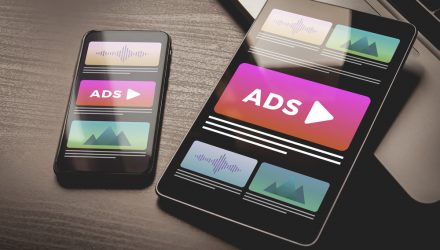Thanks to the internet’s evolution, digital advertising has long been a staple for companies from a variety of industries and the ad agencies representing those firms, but there are compelling investment implications on this front, too.
Among the various exchange traded funds with internet exposure, the ARK Next Generation Internet ETF (NYSEArca: ARKW) has the goods when it comes to helping investors access promising trends in digital advertising. Indeed, those trends are encouraging, particularly for investors planning to make ARKW a long-term holding.
“Digital advertising is a case in point. During the pandemic, digital advertising gained share as traditional advertising declined,” writes ARK Investment Management analyst Nicolas Grous in a recent note. “At the end of 2021, global digital advertising was roughly $440 billion, 62% of the market. According to our research, it will continue to grow at a 11% compound annual rate during the next eight years, surpassing $1 trillion by the end of 2029, as shown below.”
While those forecasts appear ambitious, a case can also be made that prior outlooks on digital advertising underestimated its potency and related expenditures, indicating that ARKW could potentially offer investors pleasant surprises.
“According to our research, previous forecasts underestimated the potential of digital advertising significantly. eMarketer, for example, projected in 2014 that the market would grow to $214 billion by 2018, then in 2015 to $279 billion by 2019, and finally in 2016 to $335 billion by 2020,” adds Grous.
There are at least a couple of important tailwinds to consider with ARKW regarding digital advertising. First, companies didn’t really start spending aggressively on digital ads until about 15 years ago, indicating that this trend is still young relative to other advertising venues.
Second, people are spending more time — and money — online. That could compel companies to bolster digital ad spending. In fact, there’s a long runway for digital ad spending to catch up to time spent online.
“Although time spent online increased by roughly 60% during the pandemic in 2020, digital advertising grew only 11%, resulting in a sharp drop in its monetization per hour to roughly $0.04, as shown above. Now that the impact of the crisis is diminishing, however, we are confident that the migration of advertising dollars online will accelerate, catching up with the increased time spent online,” notes Grous.
Bolstering the long-term case for ARKW’s ties to digital ad spending is the fact that this spending is expected to arrive in disruptive venues, such as augmented reality and streaming entertainment, among others.
For more news, information, and strategy, visit the Disruptive Technology Channel.
The opinions and forecasts expressed herein are solely those of Tom Lydon, and may not actually come to pass. Information on this site should not be used or construed as an offer to sell, a solicitation of an offer to buy, or a recommendation for any product.

